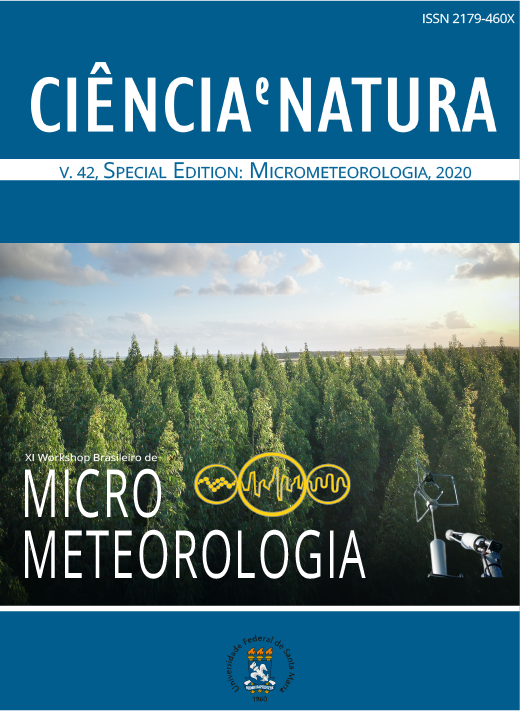Rede neural para previsão climática sazonal de precipitação no Brasil
DOI:
https://doi.org/10.5902/2179460X45358Palavras-chave:
Precipitação, Previsão climática sazonal, Rede neural auto-configuradaResumo
Precipitação é o campo meteorológico mais difícil de ser predito. Uma abordagem baseada em rede neural ótima é aplicada para previsão de precipitação para o Brasil. Uma rede neural perceptron de múltiplas camadas (RN-PMC) auto-configurada é usada como ferramenta predição. A topologia da MLP-NN é encontrada resolvendo um problema de otimização pelo algoritmo de colisão de múltiplas partículas (MPCA). Previsões para estações de inverno e verão são mostradas. A previsão neural é avaliada usando dados de reanálise do NCEP/NCAR e dados do satélite GPCP (Global Precipitation Climatology Project -- monthly precipitation dataset).
Downloads
Referências
ADLER, R. F.; HUFFMAN, G. J.; CHANG, A.; FERRARO, R.; XIE, P.-P.; JANOWIAK, J.; RUDOLF, B.; SCHNEIDER, U.; CURTIS, S.; BOLVIN, D. et al. The version-2 global precipitation climatology project (GPCP) monthly precipitation analysis (1979–present). Journal of hydrometeorology, v. 4, n. 6, p. 1147-1167, 2003.
ANOCHI, J.; SAMBATTI, S.; LUZ, E.; CAMPOS VELHO, H. F. New learning strategy for supervised neural network: MPCA meta-heuristic approach. In: 1st BRICS Countries & 11th CBIC Brazilian Congress on Computational Intelligence. Location: Recife, Brasil. Porto de Galinhas Beach. 2013.
ANOCHI, J.; SILVA, J. Uso de redes neurais artificiais e teoria de conjuntos aproximativos no estudo de padrões climáticos sazonais. Learning and Nonlinear Models, v. 7, p. 83–91, 2009.
ANOCHI, J. A.; CAMPOS VELHO, H. F. Optimization of feedforward neural network by multiple particle collision algorithm. In: IEEE. 2014 IEEE Symposium on Foundations of Computational Intelligence (FOCI), p. 128–134, 2014.
BABOO, S. S.; SHEREEF, I. K. An efficient weather forecasting system using artificial neural network. International journal of environmental science and development, v. 1, n. 4, p. 321, 2010.
ECHEVARRÍA, L. C.; SANTIAGO, O. L.; NETO, A. J.S. Aplicación de los algoritmos evolución diferencial y colisión de partículas al diagnóstico de fallos en sistemas industriales. Investigación Operacional, v. 33, n. 2, p. 160–172, 2014.
HAYKIN, S. Neural networks: a comprehensive foundation. Prentice Hall PTR, 1994.
KALNAY, E.; KANAMITSU, M.; KISTLER, R.; COLLINS, W.; DEAVEN, D.; GANDIN, L.; IREDELL, M.; SAHA, S.; WHITE, G.; WOOLLEN, J. et al. The NCEP/NCAR 40-year reanalysis project. Bulletin of the American meteorological Society, American Meteorological Society, v. 77, n. 3, p. 437–472, 1996.
LUZ, E. F. P. da; BECCENERI, J. C.; CAMPOS VELHO, H. F. A new multi-particle collision algorithm for optimization in a high performance environment. Journal of Computational Interdisciplinary Sciences, v. 1, n. 1, p. 3–10, 2008.
RUIVO, H. M.; CAMPOS VELHO, H. F. de; SAMPAIO, G.; RAMOS, F. M. Analysis of extreme precipitation events using a novel data mining approach. American Journal of Environmental Engineering, v. 5, n. 1A, p. 96–105, 2015.
SACCO, W. F.; OLIVEIRA, C. R. D. A new stochastic optimization algorithm based on a particle collision metaheuristic. Proceedings of 6th WCSMO, 2005.
SAMBATTI, S. B. M.; ANOCHI, J. A.; LUZ, E. F. P.; CARVALHO, A. R.; SHIGUEMORI, E. H.; CAMPOS VELHO, H. C. Automatic configuration for neural network applied to atmospheric temperature profile identification. In: 3rd International Conference on International Conference on Engineering Optimization, p. 1–9, 2012.
SOUSA, W. d. S.; SOUSA, F. d. A. de. Rede neural artificial aplicada à previsão de vazão da bacia hidrográfica do rio piancó. Revista Brasileira de Engenharia Agricola e Ambiental-Agriambi, v. 14, n. 2, 2010.
TORRES, R. H.; LUZ, E.; CAMPOS VELHO, H. C. Multi-particle collision algorithm for solving an inverse radiative problem. In: Integral Methods in Science and Engineering. Birkhäuser, Cham, 2015. p. 309-319.
Downloads
Publicado
Como Citar
Edição
Seção
Licença
Para acessar a DECLARAÇÃO DE ORIGINALIDADE E EXCLUSIVIDADE E CESSÃO DE DIREITOS AUTORAIS clique aqui.
Diretrizes Éticas para Publicação de Revistas
A revista Ciência e Natura está empenhada em garantir a ética na publicação e na qualidade dos artigos.
A conformidade com padrões de comportamento ético é, portanto, esperada de todas as partes envolvidas: Autores, Editores e Revisores.
Em particular,
Autores: Os Autores devem apresentar uma discussão objetiva sobre a importância do trabalho de pesquisa, bem como detalhes e referências suficientes para permitir que outros reproduzam as experiências. Declarações fraudulentas ou intencionalmente incorretas constituem comportamento antiético e são inaceitáveis. Artigos de Revisão também devem ser objetivos, abrangentes e relatos precisos do estado da arte. Os Autores devem assegurar que seu trabalho é uma obra totalmente original, e se o trabalho e / ou palavras de outros têm sido utilizadas, isso tem sido devidamente reconhecido. O plágio em todas as suas formas constitui um comportamento publicitário não ético e é inaceitável. Submeter o mesmo manuscrito a mais de um jornal simultaneamente constitui um comportamento publicitário não ético e é inaceitável. Os Autores não devem submeter artigos que descrevam essencialmente a mesma pesquisa a mais de uma revista. O Autor correspondente deve garantir que haja um consenso total de todos os Co-autores na aprovação da versão final do artigo e sua submissão para publicação.
Editores: Os Editores devem avaliar manuscritos exclusivamente com base no seu mérito acadêmico. Um Editor não deve usar informações não publicadas na própria pesquisa do Editor sem o consentimento expresso por escrito do Autor. Os Editores devem tomar medidas de resposta razoável quando tiverem sido apresentadas queixas éticas relativas a um manuscrito submetido ou publicado.
Revisores: Todos os manuscritos recebidos para revisão devem ser tratados como documentos confidenciais. As informações ou ideias privilegiadas obtidas através da análise por pares devem ser mantidas confidenciais e não utilizadas para vantagens pessoais. As revisões devem ser conduzidas objetivamente e as observações devem ser formuladas claramente com argumentos de apoio, de modo que os Autores possam usá-los para melhorar o artigo. Qualquer Revisor selecionado que se sinta desqualificado para rever a pesquisa relatada em um manuscrito ou sabe que sua rápida revisão será impossível deve notificar o Editor e desculpar-se do processo de revisão. Os Revisores não devem considerar manuscritos nos quais tenham conflitos de interesse resultantes de relacionamentos ou conexões competitivas, colaborativas ou outras conexões com qualquer dos autores, empresas ou instituições conectadas aos documentos.






